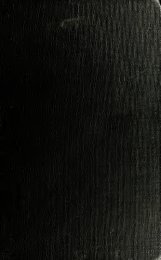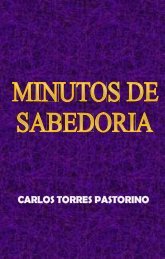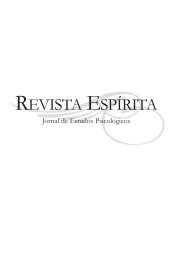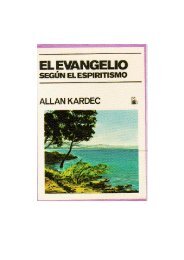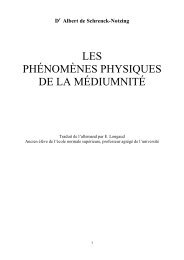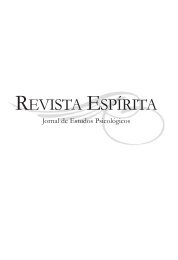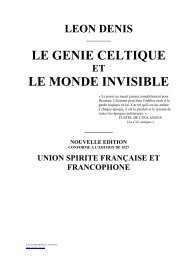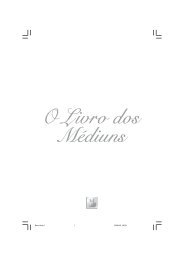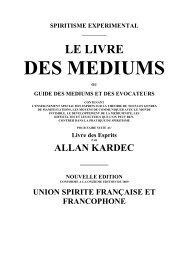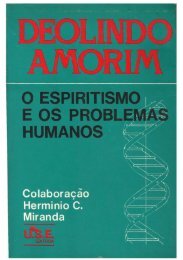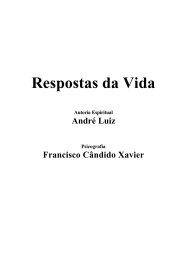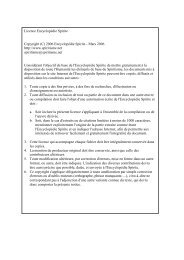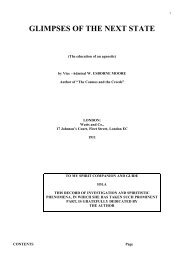'Twixt two worlds : a narrative of the life and work of William Eglinton
'Twixt two worlds : a narrative of the life and work of William Eglinton
'Twixt two worlds : a narrative of the life and work of William Eglinton
You also want an ePaper? Increase the reach of your titles
YUMPU automatically turns print PDFs into web optimized ePapers that Google loves.
1 58 <strong>'Twixt</strong> Two Worlds.<br />
What association <strong>of</strong> ideas can be set in train by " page 199, line 14" This inquiry reminds<br />
us <strong>of</strong> what can be nothing more than a coincidence, namely, that <strong>the</strong> last word <strong>of</strong> <strong>the</strong> fourteenth<br />
line was a cipher, which (regarded as a numerical figure) is <strong>the</strong> class <strong>of</strong> association one<br />
would expect from figures 199, 14, O, belonging, as it were, to <strong>the</strong> same family. But it is<br />
merely a coincidence, for psychography told us that on that page was "a table" (singularly<br />
enough Table A).<br />
2. If <strong>the</strong> latent thought were revived by volition (as happens when we tell ano<strong>the</strong>r our<br />
name <strong>and</strong> address), it would come into <strong>the</strong> field <strong>of</strong> consciousness. Mr. <strong>Eglinton</strong> denies any<br />
conscious revival.<br />
3. That <strong>the</strong>re is present in <strong>the</strong> medium some abnormal excitement during <strong>the</strong> occurrence<br />
<strong>of</strong> <strong>the</strong>se psychographic phenomena <strong>the</strong>re can be no doubt. Of <strong>the</strong> causes <strong>of</strong> this excitement<br />
we are very ignorant, but it may be remarked that inasmuch as <strong>the</strong> effects seem to be simply<br />
muscular <strong>and</strong> nervous, nei<strong>the</strong>r exciting nor depressing <strong>the</strong> mind <strong>of</strong> <strong>the</strong> subject, this phenomenon<br />
cannot well be classed with those well-established facts where <strong>the</strong> most remotely hidden<br />
memories flash into consciousness in states <strong>of</strong> rare cerebral excitement, for at such times<br />
<strong>the</strong>re is always great mental disturbance, bordering <strong>and</strong> <strong>of</strong>ten entering upon delirium. I cannot<br />
speak too well <strong>of</strong> Mr. <strong>Eglinton</strong>'s disposition to assist me in my investigation <strong>of</strong> <strong>the</strong> remarkable<br />
phenomena attending his mediumship. He takes an intelligent interest in his <strong>work</strong>, <strong>and</strong><br />
deserves <strong>the</strong> gratitude <strong>and</strong> encouragement <strong>of</strong> all serious students <strong>of</strong> this pr<strong>of</strong>ound <strong>and</strong> important<br />
subject.<br />
A somewhat different experiment as to its details, but pointing to <strong>the</strong> same conclusions,<br />
is that narrated by Mr. A. G. Leonard, M.A., <strong>of</strong> 44, Highbury Hill, N., <strong>and</strong> Major Le Mare<br />
Taylor, Staff-Instructor <strong>of</strong> <strong>the</strong> Royal Military College, S<strong>and</strong>hurst.<br />
A seance was held at Mr. <strong>Eglinton</strong>'s at five p.m. on Monday, 29th June, 1885. The three<br />
gentlemen took <strong>the</strong>ir seats round <strong>the</strong> table in <strong>the</strong> usual manner, Major Taylor, who was seated<br />
at Mr. <strong>Eglinton</strong>'s right h<strong>and</strong>, holding with his left Mr. <strong>Eglinton</strong>'s left h<strong>and</strong>. Mr. Leonard,<br />
sitting on <strong>the</strong> right <strong>of</strong> Major Taylor, held with both h<strong>and</strong>s Major Taylor's right h<strong>and</strong>. Mr.<br />
<strong>Eglinton</strong>'s right h<strong>and</strong> was disengaged. The seance lasted for over half-an-hour, <strong>and</strong> no results<br />
whatever were obtained, though Mr. <strong>Eglinton</strong> was holding a slate under <strong>the</strong> table in <strong>the</strong><br />
usual way. Conversation turned upon an experiment that Major Taylor had made at a<br />
previous seance, when <strong>the</strong> number <strong>of</strong> matches in a match-box, from which an indefinite<br />
number had been removed by <strong>two</strong> or three sitters, had been correctly written on <strong>the</strong> slate.<br />
Mr. <strong>Eglinton</strong> regretted that, on <strong>the</strong> occasion referred to, <strong>the</strong> match-box had not been marked,<br />
for (he suggested) a Sadducean world would say that ano<strong>the</strong>r match-box, with a known number<br />
<strong>of</strong> matches, had been substituted for <strong>the</strong> one being used in <strong>the</strong> experiment. It was, <strong>the</strong>refore,<br />
determined to repeat <strong>the</strong> test, taking every precaution that could be thought <strong>of</strong>.<br />
Major Taylor chanced to have in his pocket a box <strong>of</strong> " T<strong>and</strong>stickor " matches. Major<br />
Taylor <strong>and</strong> Mr. Leonard <strong>the</strong>n went aside to <strong>the</strong> window <strong>and</strong> marked with <strong>the</strong>ir initials both <strong>the</strong><br />
box <strong>and</strong> cover. Major Taylor <strong>the</strong>n removed a large number <strong>of</strong> <strong>the</strong> matches, leaving an unknown<br />
quantity in <strong>the</strong> box. Mr. Leonard <strong>the</strong>n replaced a few (he knew not how many) in <strong>the</strong> box.<br />
A slip <strong>of</strong> paper was placed above <strong>the</strong> matches in <strong>the</strong> box, <strong>and</strong> <strong>the</strong> box was closed. Nei<strong>the</strong>r



